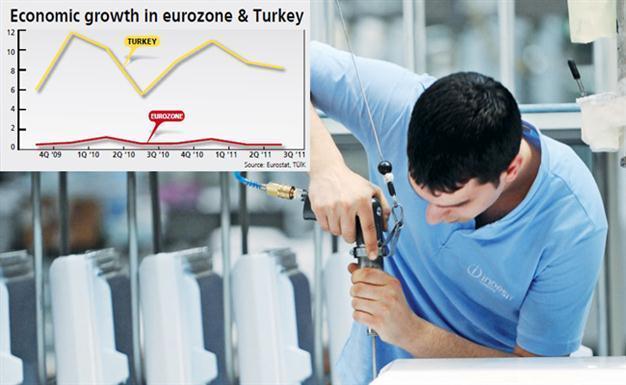Turkey posts record growth on rocky path
ISTANBUL - Hürriyet Daily News

An employee works on assembly line at a fridge-making plant in the Aegean province of Manisa. AA photo
Turkey’s latest growth data has exceeded all expectations but the impressive numbers suggest the government’s efforts to slow down the economy are failing to achieve satisfactory results, according to economists.Turkish ministers praised the country’s growth rate of 8.2 percent gross domestic product in the third quarter, way above a number of Ankara’s biggest European trade partners.
“In the first two quarters of 2011, Turkey’s growth surpassed those of other nations and our third-quarter growth, which exceeded our expectations, proved once more that Turkey is unique,” Economy Minister Zafer Çağlayan said yesterday in a written statement. “We weren’t surprised by this growth rate.”
In addition to the government’s failure to slow down the economy, however, the country’s current-account deficit also widened from $3.4 billion to $4.2 billion in October 2011 over the same month last year, according to data released yesterday by the Turkish Statistical Institute (TÜİK). That was another indicator that raised questions, according to analysts.
TUİK announced yesterday that the country’s GDP growth had grown 8.2 percent in the third quarter of 2011, far exceeding the market consensus of 6.7 percent. In addition, the first quarter growth rate in 2011 was revised up to 12 percent from 11.6 percent.
Çağlayan said Turkish growth exceeded even that of China’s growth over the first nine months, while third-quarter growth was exceeded only by China among the Group of 20 major economies. China’s economy expanded 9.1 percent in the third quarter, while Germany, which is embroiled in Europe’s sovereign-debt crisis and is Turkey’s biggest trade partner, grew 2.6 percent.
Even if Turkey were to post only a 2 percent growth rate in the last quarter of 2011, this would still put Turkey’s yearend growth rate at around 7.8 percent, some 0.3 above the government’s medium-term program revealed last year, the minister said.
“We expect the gross domestic growth of the country to be beyond our expectation in midterm economic program due to the strong economic performance of Turkey in the last nine months,” Ali Babacan, Turkey’s deputy prime minister, said during a press meeting in Ankara.
Exports played a major role in Turkish growth, according to Çağlayan. Automotive, ready-to-wear, chemicals and steel sectors led Turkish exports in the third quarter, according to official data.
Five sectors were effective in high growth rate, namely, construction, wholesale trade, manufacturing, financial institutions and transportation, according to BGC Partners’ chief economist, Özgür Altuğ.
Altuğ said public consumption growth remained high at 13.7 percent in the third quarter while private domestic consumption posted an impressive 7 percent increase in the same period.
“In general we think that the figures are quite encouraging in terms of economic activity. We think that the third-quarter growth data is the confirmation that the Central Bank will continue to use its interest rate corridor policy for a long time,” said Altuğ.
“The Turkish economy continues to show Asian-style growth dynamics,” Timothy Ash, chief of emerging market research at the Royal Bank of Scotland, said in an emailed report yesterday. “There is very little convincing evidence that the Central Bank and government measures thus far are engineering much of a slowdown.”
“The Turkish economy was growing too fast for its own good in the first three quarters and we’re going to have to see a major adjustment,” İnan Demir, chief economist for Finansbank, told Bloomberg News in a telephone interview. “Given that we began the year with an agenda of reducing growth, our forecast of 8.3 percent for the full year is not a successful outcome.”
“There’s got to be some slowdown, although so far the signs of it have been meager,” said Yarkin Cebeci, an Istanbul-based economist for JPMorgan Chase.
The cumulative current-account deficit in 12-months climbed to $78.6 billion, the Central Bank said yesterday. The figure equals about 10 percent of gross domestic product.
















